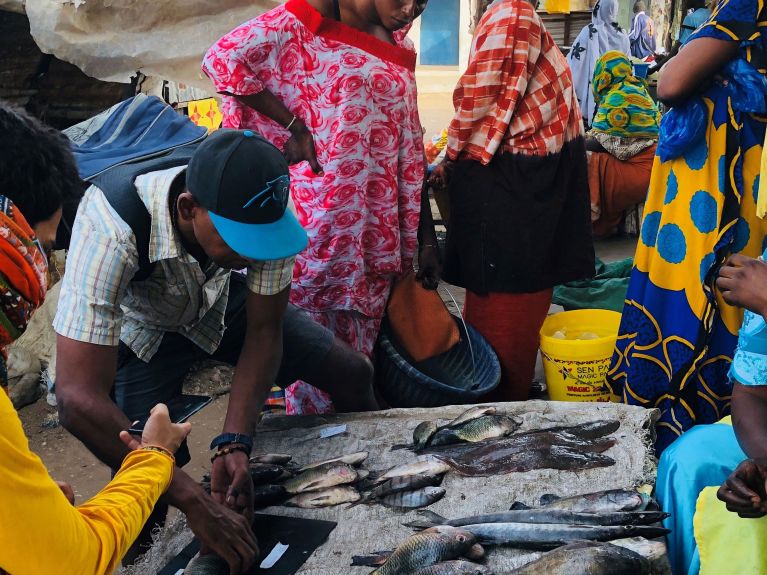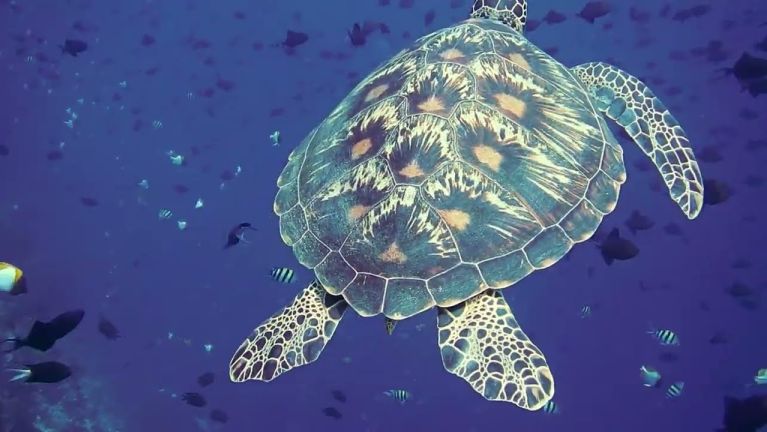Working together to protect the seas
African and German researchers are cooperating on the MeerWissen initiative. Their work for marine protection is also intended to have a political impact.

Pollution, overfishing, climate change: all over the world, the seas are threatened by human activity. Africa is surrounded by the Mediterranean in the north, by the Red Sea and Indian Ocean in the east, and by the Atlantic in the west. Coastal states rely on healthy ecosystems, for example for their economies and to feed their populations. The MeerWissen initiative is therefore keen to make a contribution to protecting the seas around Africa. To this end, scientists from African countries and from Germany are working together. Their projects aim for instance to make oceanic or fishing data available and to protect biodiversity, be it at-risk eels in Tanzania or endangered penguins in Namibia and South Africa.
An appeal to save the seas
MeerWissen was initiated by Germany’s Federal Ministry for Economic Cooperation and Development (BMZ) in 2018 following a United Nations appeal to save the seas at its first Ocean Conference. Sven Stöbener, spokesperson of the MeerWissen secretariat, believes that clear political goals are needed to better protect them. “To define such goals, African partner countries frequently lack the necessary scientifically founded decision-making bases that are tailored to the regional context.” Researchers now intend to provide information that can serve as the basis for political action.
Dieses YouTube-Video kann in einem neuen Tab abgespielt werden
YouTube öffnenThird party content
We use YouTube to embed content that may collect data about your activity. Please review the details and accept the service to see this content.
Open consent formThe first teams began their work in 2019, projects being funded with up to 250,000 euros. Eleven projects are currently in their final phase, and one has already been concluded. Four new projects are to be launched in the summer of 2022. 32 institutions in all are taking part in the initiative: in Germany, these include the GEOMAR Helmholtz Centre for Ocean Research, the Alfred Wegener Institute and Kiel University, while the South African National Biodiversity Institute (SANBI), the University of Namibia and the Tanzania Fisheries Research Institute (TAFIRI) are among those participating in Africa. One of the central guiding principles of MeerWissen is to establish partnerships on an equal footing. As Stöbener explains, African institutions were given access to the technologies, innovations and networks of German marine research. The latter profits in turn from the expertise of its African partners, which allows it to gear its work to national and regional agendas and requirements.
More knowledge about eels
The Bremerhaven-based Thünen Institute for example is regarded as one of the world’s leading centres of research into freshwater eels. In the MeerWissen project BIOEELS-TZ, the researchers draw on their knowledge of eels in temperate zones to research tropical species. Tanzania is home to more than 40 eel-like fishes; some of these snake-like bony fishes are endangered. To protect them, the biodiversity of migrating eels in coastal rivers is being studied, among other things.
The university in Dar es Salaam and the TAFIRI are responsible for the socioeconomic part of the project, as BIOEELS-TZ combines biology and the social sciences. Part of the research involves interviewing fishermen, for instance. Because eels react sensitively to environmental changes and Tanzania’s population is set to see considerable growth, it is important to preserve the eels, protect their natural habitats and ensure sustainable fishing.
For diversity in the seas
Mouhamed Moustapha Fall and Kwabena Owusu from the African Institute for Mathematical Sciences (AIMS) in Senegal and Agostino Merico from the Leibniz Centre for Tropical Marine Research (ZMT) in Bremen are convinced that their project INDUCE can have a political impact. Though the coasts of Senegal are characterised by great biodiversity, these areas are also important for the country’s economy. “The project INDUCE seeks to produce sound scientific knowledge for the conservation of fish functional diversity from socially inclusive and environmentally sustainable economic growth perspectives in Senegal”, says Owusu . The ZMT and the AIMS have already been working together for almost ten years, and the Oceanographic Research Center of Dakar-Thiaroye (CRODT) is now also involved in INDUCE. Together they are studying the diversity of fish species in Senegal.

“The African continent is a great source of competences and data but at the same time has several socio-economic and environmental problems”, Owusu explains. And there are virtually no grants from the state to resolve them. “MeerWissen offers opportunities to study environmental problems and their impacts on an international basis”, says Merico. For one thing is clear: the consequences of ecological changes are global – they affect not only one country or one continent, but the entire world. MeerWissen demonstrates how something can be done to protect the environment if people work together.


